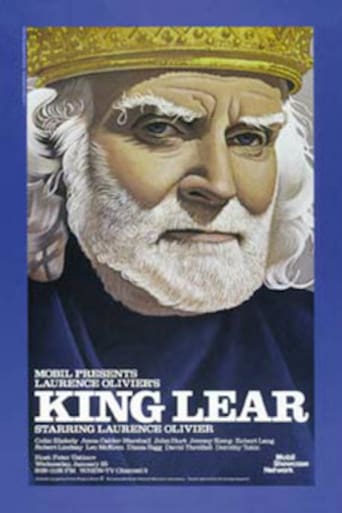alexanderbarnett
King Lear is Shakespeare's greatest play and very likely the greatest work in all of literature. Its themes are of the most profound nature: redemption; self-realization; the myth of universal justice; fortuitousness in the battle between good and evil; the nature of evil. The 80-year old Lear has been King for many decades. During his reign he has slowly and inexorably become blind to reality. He is a man of vast potential; a man of enormous passion, humanity, dignity and strength who has been inundated with lies, flattery, unchallenged obedience and false adoration. When the play opens, Lear's psychological state is such that he is often incapable of controlling his strongest emotions. Lear has always been a man of towering passion, but had the incredible mind and will to match it. Now, however, his purpose and control have been eroded by his increasingly irrational emotional state. In any production of King Lear, we must see the lion in Lear and his raging battle between his age and failing mind. There must be a constant struggle between the Lear of old and the present Lear. If we don't see the towering Lear we're left with the ill, debilitated, sorrowful Lear and the conflict is gone - we never see his basic nature, which is the cause of decline. What makes him so fascinating and exciting (there is absolutely nothing fascinating or exciting about Olivier's Lear) are his tremendous extremes of temperament. First and foremost he must always be a fighter and never give in to adversity. Olivier's Lear could never have been a towering figure, only a whining, crying, feeble, self pitying grouch. In fact, this is exactly how he saw the role. In an interview at the time, he said, "Lear is an easy role to do. He is simply an old fart". This, about a man who fights an epic and magnificent struggle against overwhelming physical and emotional turmoil and whose implacable refusal to surrender make him one of the greatest, most towering and passionate tragic characters ever created. And the most difficult portrayal in the entire Shakespearean canon. The actor portraying Lear can't drive the torment, confusion and bewilderment that emanates from Lear – they must drive him. No amount of brilliant faking will work. It's either real or not. We must see the torment. Olivier's whimpering, faked performance is totally devoid of this. Unfortunately, the rest of the cast is also totally lacking. The actor playing Gloucester has four qualities throughout: grief, bluster, loud and louder. His voice is so unpleasant it's unbearable listening to him. He plays the same boisterous level continuously without the slightest nuance. Gloucester is an undiscerning, selfish, credulous and superstitious man. He is basically decent, but with a weak, impressionable nature. If Gloucester, as here portrayed, is loud, crude, obnoxious and stupid, a catharsis is impossible. Edgar, Gloucester's legitimate son, is a totally trusting, inexperienced and ingenuous soul who has vast, untapped potential. He goes through an incredible process of development and maturity. This Edgar comes across as a demented, weird, dull-witted creep. The idea, at the end of the play, that he may possibly become one of the leaders of Britain is too ludicrous and frightening to contemplate. Edmund, Gloucester's bastard son is willing to do anything to achieve his nefarious ends. He is not immoral, but amoral. He has the uncanny ability to unleash each woman's full sexual potential. This, plus his physical attractiveness, his feigned but convincing warmth and concern, his self-confidence and sense of humor make him an ideal, consummate lover. With the obvious obsession that Goneril and Regan have for Edmund, nothing less will suffice. In this version Edmund comes across as a weak, boyish, obviously villainous child who lacks the charm, confidence, fearlessness, dominance and supreme ability to dupe others. To think that this innocuous little boy conquers Goneril and Regan and comes within a hair's breadth of assuming the throne of Britain is hilarious. Albany, Goneril's husband, is a decent, sensitive, ethical and intelligent man who prefers to avoid altercation and acrimony. Unfortunately, he is portrayed here as a lethargic, pedestrian slow-thinking dunce with no obvious appeal or perception. Cordelia is not, as here seen, a sweet, frail, delicate ingénue. If she were, Lear would never favor her. She is, rather, much like Lear: resolute, dignified, proud, outspoken and fearless. This is why Lear adores her. Indeed, she must match Regan and Goneril in strength and tenacity. It's inconceivable imagining this Cordelia leading an army to rescue her father. The Fool comes across as analytical, sober and objective, when he should be a creature of nature. Pure instinct. Spontaneous, unpredictable and uncontrollable. As written, Goneril is the dominating sister; here we have the opposite. This Regan would have killed Goneril before she allowed herself to be murdered. The directing is abominable and senseless. Just a few examples. After Cordelia blatantly attacks her sisters' hypocrisy, they all embrace warmly. Ludicrous. When Edmund and Goneril are leaving together for Goneril's castle, Regan blatantly embraces Edmund in front of Cornwall, making clear her feelings for him. Absurd. Regan and Edmund could not have been alone together, much less been intimate, since Regan and Cornwall arrived at Gloucester's the same night as the blinding of Gloucester and the wounding of Cornwall. Regan walks out on Cornwall, leaving him to die after he's wounded by one of his men. Their last lines (which of course are cut) belie this. The fact is Regan and Edmund become intimate after Cornwall dies and Edmund returns with Goneril's message. I could cite numerous other examples. Suffice it to say that the direction is devoid of nuance, passion and intelligence. The blocking is pedestrian: stilted, simplistic, unimaginative and unmotivated. Ultimately, Lear, the 80-year old with the heart of a gladiator, should arouse in us, not tears, primarily, but awe that such a man could exist. Unfortunately, Olivier achieved his vision. This King Lear is indeed an old fart.


